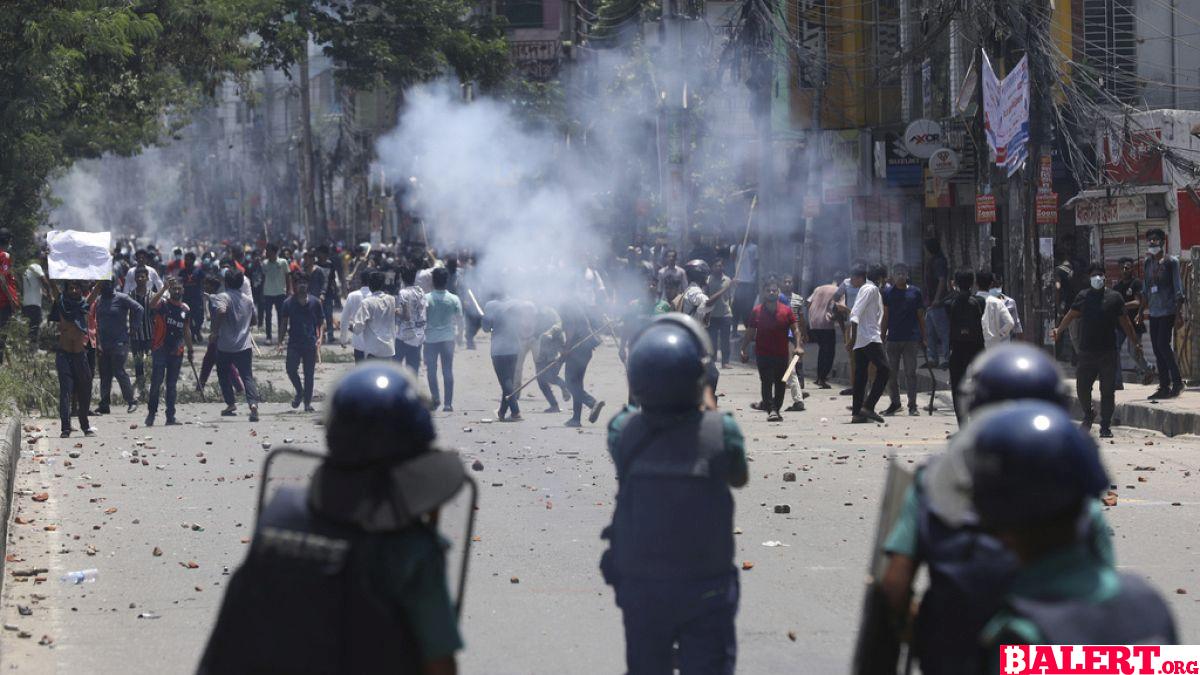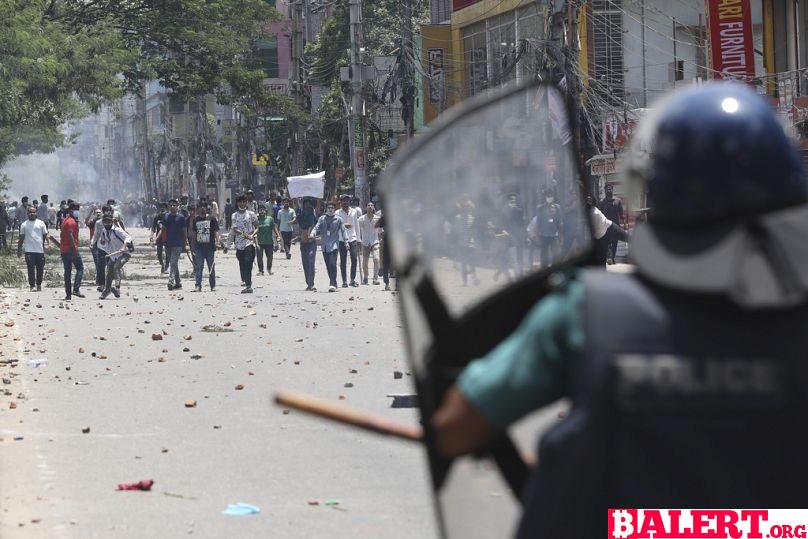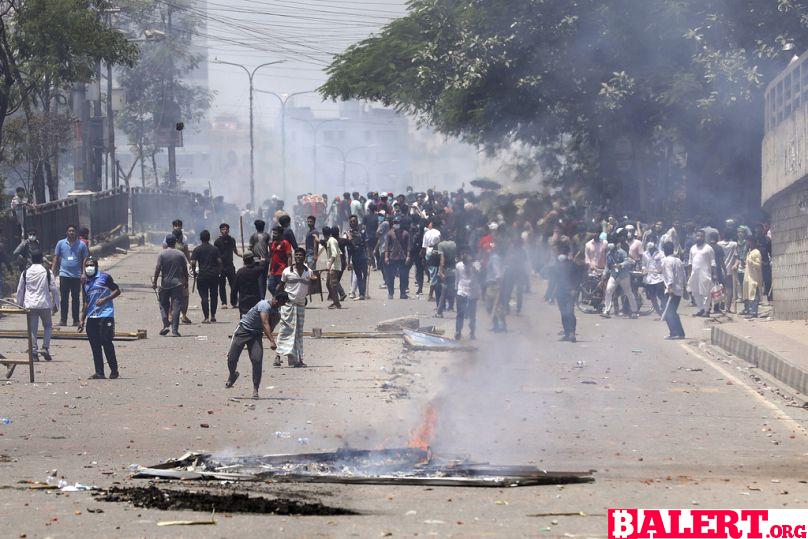World
Protests in Bangladesh Over Job Quota System Escalate Amid Violence
Violence erupts as protests in Bangladesh intensify over the controversial job quota system. Citizens voice their demands for reforms, highlighting the growing tensions and discontent with government policies that affect employment opportunities.

Protests Erupt in Bangladesh Over Government Job Quotas

In a dramatic escalation of tensions, police and security forces in Bangladesh resorted to firing bullets and deploying tear gas against protesters in the capital on Friday. This response came after a series of deadly clashes sparked by widespread discontent over government job allocations. Internet and mobile services were shut down as authorities sought to quell the unrest, which has persisted for several days.
The protests, initially ignited weeks ago, intensified sharply starting on Monday, representing a significant challenge to Prime Minister Sheikh Hasina’s administration. Hasina, who has secured a fourth consecutive term since the January elections—boycotted by major opposition groups—now faces mounting pressure from disaffected students and job seekers.
Local media outlet Somoy TR reported that four more individuals lost their lives amid the latest confrontations. This follows a particularly violent day of protests where local reports indicated that 22 people were killed as students attempted to enforce a nationwide shutdown. The government has yet to confirm these casualty figures.
The unrest has exposed underlying fractures in Bangladesh’s governance and economy, particularly the frustrations of young graduates struggling to find decent employment. In response, the government has deployed police and paramilitary forces throughout the capital, effectively locking down university campuses and dispersing crowds. On Wednesday, several universities, including the largest in the country, suspended classes and closed dormitories. By Friday, Dhaka police announced a total ban on all gatherings and demonstrations in the capital.
An Associated Press reporter witnessed border guard officials firing upon a crowd of over 1,000 protesters who had gathered outside the head office of state-run Bangladesh Television. The day prior, the building had been attacked and set ablaze by demonstrators. In the ensuing chaos, border guards discharged rifles and sound grenades, while police retaliated with tear gas and rubber bullets. The streets were littered with spent bullet casings and stained with blood.
According to a news producer and reporter from Bangladesh Television, protesters had breached the main gate, setting fire to vehicles and the reception area. Speaking anonymously due to safety concerns, one producer recounted, “I escaped by leaping over the wall, but some of my colleagues were trapped inside. The attackers entered the building and set furniture ablaze.”
As tensions continued to escalate, student protesters vowed to further extend their calls for a nationwide shutdown, urging mosques across the country to hold funeral prayers for those who had been killed in the violence. Major universities have announced closures until the situation stabilizes. The protesters are demanding an end to a quota system that allocates up to 30% of government jobs to relatives of veterans who fought in Bangladesh’s 1971 war of independence against Pakistan. Critics argue that the quota system is discriminatory, favoring supporters of Prime Minister Sheikh Hasina’s Awami League party, which spearheaded the independence movement. They are calling for a transition to a merit-based hiring system.
Despite the protests, Hasina has defended the quota system, asserting that the veterans deserve the utmost respect for their contributions to the country, regardless of their political affiliations. While Hasina’s government is credited with fostering significant economic growth in Bangladesh, rising inflation—partly fueled by global upheaval due to the war in Ukraine—has led to labor unrest and increasing dissatisfaction among the populace.

Even as job opportunities have expanded in some sectors, many individuals prefer government employment, viewing it as more secure and financially rewarding. However, competition is fierce, with approximately 400,000 graduates vying for a mere 3,000 positions available through the civil service exam each year.
“The situation unfolding in Bangladesh is profoundly concerning for a generation that simply seeks fair opportunities in public service recruitment,” stated Saad Hammadi, policy and advocacy manager at the Balsillie School of International Affairs in Canada, who has championed freedom of expression in the country. “The transformation of a peaceful protest into a scene of lawlessness reflects the government’s short-sightedness and ineffective policy governance.”
The internet shutdown has exacerbated the crisis, rendering local news sites inaccessible and isolating citizens from global communications. This measure has been employed by the government to suppress dissent, with internet watchdog Access Now reporting three shutdowns in Bangladesh in 2023, all coinciding with opposition rallies. Last year, the organization noted a total of six shutdowns in the country.
In a broader context, the non-profit organization CIVICUS, which monitors civic freedoms worldwide, downgraded Bangladesh to a “closed” status in its ratings last year—placing it in the same category as China and Venezuela—due to a crackdown on opposition figures and supporters ahead of national elections.
The main opposition party, the Bangladesh Nationalist Party (BNP), has expressed solidarity with the protesting students and pledged to organize its own demonstrations. Many BNP supporters have actively joined the students’ protests. On Friday, police confronted a few hundred BNP supporters, using tear gas and arresting senior BNP leader Ruhul Kabir Rizvi. The government has accused the BNP of inciting violence, conducting raids on the party’s headquarters earlier in the week and detaining activists from its student wing.
The Awami League and the BNP have a long history of mutual accusations over instigating political chaos and violence, particularly in the lead-up to national elections marred by governmental crackdowns on opposition figures. In a notable shift, Hasina’s government had previously suspended job quotas amid widespread student protests in 2018. However, a recent ruling from Bangladesh’s High Court reinstated these quotas after petitions from relatives of the 1971 veterans, sparking the current wave of demonstrations.
The Supreme Court has since suspended the High Court’s ruling pending an appeal hearing, with a statement indicating it will address the matter on Sunday. In a televised address on Wednesday, Hasina urged protesters to “exercise patience” while awaiting the court’s verdict, expressing her belief that justice would ultimately prevail for the students.
World
Dominique Pelicot Testifies in Harrowing Rape Trial
Join us as Dominique Pelicot courageously testifies in a harrowing rape trial, shedding light on the complexities of trauma and justice. Her powerful story raises crucial questions about the legal system and the importance of support for survivors.

Dominique Pelicot Takes the Stand in Shocking Rape Trial
In a courtroom drama that has captivated France and garnered international attention, Dominique Pelicot, the man at the center of a harrowing rape trial, finally addressed the court. With tears streaming down his face, he recounted how his wife had been instrumental in helping him cope with a tumultuous past marked by trauma. He revealed that he had endured a sexual assault at the tender age of nine while hospitalized, and he also witnessed a gang rape during his teenage years while working as an apprentice electrician on a construction site.
“She didn’t deserve this, I acknowledge that,” Mr. Pelicot stated, his voice barely audible as he struggled to convey his emotions. The gravity of the situation weighed heavily on him, and the courtroom fell silent, straining to catch his every word.
Now 71 years old, Mr. Pelicot faces serious allegations of drugging his wife, Gisèle Pelicot, whom he has been married to for half a century, over a span of nearly ten years. Prosecutors contend that he used drugs to render her comatose, allowing him to rape her repeatedly. Furthermore, authorities allege that he went so far as to invite numerous men into their home, facilitating a nightmarish scenario where they, too, engaged in the assault of his wife.
Overall, 51 men, including Mr. Pelicot, are on trial concurrently, primarily facing charges related to the aggravated rape of Ms. Pelicot. Among them, one individual has already pleaded guilty to similar crimes, admitting to drugging his own wife to assault her and inviting Mr. Pelicot to partake in the horrific act while she was incapacitated.
Mr. Pelicot’s unexpected testimony came after a tumultuous start to the trial. Just a week in, he was stricken with severe health issues that forced him to miss four consecutive days in court. The head judge ultimately decided to postpone proceedings, as Mr. Pelicot was diagnosed with kidney stones, a kidney infection, and prostate complications, adding yet another layer of complexity to this already harrowing case.
World
Meta Bans Russian State Media Outlets from Social Media Platforms
Explore the implications of Meta’s decision to ban Russian state media outlets from its social media platforms. Understand the impact on information dissemination and the ongoing battle against misinformation in the digital landscape.

Meta Imposes Global Ban on Russian State Media Outlets
In a significant move, Meta Platforms, Inc., the parent company of Facebook, has announced the prohibition of Russian state media outlets, including RT (Russia Today) and Rossiya Segodnya, from all its social media platforms. The decision stems from the company’s concerns regarding the deceptive strategies employed by these media organizations to execute covert influence operations across the internet.
Meta made this announcement on Monday, emphasizing that the ban will be enforced worldwide across its various platforms, such as Instagram, WhatsApp, and Threads. The rollout of this ban is expected to take place over the coming days.
Statement from Meta
A spokesperson for Meta elaborated on the decision, stating, “After careful consideration, we have expanded our ongoing enforcement actions against Russian state media outlets. As a result, Rossiya Segodnya, RT, and other affiliated entities are now banned from our applications globally due to their involvement in foreign interference activities.”
For further insights into this development, watch the video in the player above.
World
Trump Recalls Alleged Assassination Attempt While Golfing
Explore Donald Trump’s chilling recollection of an alleged assassination attempt he experienced while enjoying a round of golf. Delve into the tense moments and his reflections on safety, fame, and the unpredictability of public life.

In a recent interview on the social media platform X, Republican presidential nominee Donald Trump recounted a harrowing incident he claims to have experienced while playing golf. Trump described how, during a peaceful Sunday morning round with friends, the tranquility of the day was abruptly shattered by the sound of gunfire in the air.
“It was a beautiful day, everything was just perfect,” Trump reflected. “Then all of a sudden, we heard shots being fired—probably around four or five in total.” He went on to explain that a Secret Service agent was the first to spot the suspect, who was allegedly armed with an AK-47, a powerful assault rifle.
“The agent saw the barrel of the weapon and immediately took action, returning fire at the barrel and aiming in the direction of the bushes,” Trump detailed. “I would have loved to have sunk that last putt, but we decided it was best to leave the scene promptly.”
Trump expressed his gratitude towards the agents and a vigilant civilian who aided in tracking down the suspect, who was eventually apprehended following a high-speed chase.
Suspect Faces Multiple Federal Gun Charges
The FBI has identified the suspect as Ryan Wesley Routh, accusing him of targeting Trump during his time at the golf club in West Palm Beach, Florida. According to an FBI report, Routh had allegedly hidden among the hedges of the golf course for an astonishing 12 hours. Authorities discovered an SKS-style assault rifle, a GoPro camera, and a bag of food at the scene.
The 58-year-old Routh is now facing two serious federal gun charges. If convicted on both counts, he could face a combined maximum sentence of 20 years in prison. Notably, neither of the charges is directly related to an assassination attempt. The first charge pertains to possessing a firearm despite a prior felony conviction, which carries a potential 15-year sentence, a fine of $250,000 (€225,000), and three years of supervised release.
The second charge involves possession of a firearm with an obliterated serial number, which could result in a five-year prison term, the same financial penalties, and also three years of supervised release. As the investigation continues, additional charges could be forthcoming.
While the motive behind Routh’s actions remains unclear, his digital footprint reveals strong political affiliations, particularly concerning issues surrounding Ukraine and China. Routh consistently expressed support for Ukraine across various social media platforms, even claiming to have orchestrated a recruitment scheme for international volunteers aiming to assist Ukraine in its fight against Russia’s invasion. This behavior has been denounced by Ukrainian soldiers and members of the International Legion, who disavowed Routh’s actions and motives.
-

 Business5 months ago
Business5 months agoThe Significance of Jackson Hole: A Central Banking Tradition
-

 Tech4 months ago
Tech4 months agoNew Leaks and Features About the Samsung Galaxy S25 Ultra
-

 Business7 months ago
Business7 months agoObituary: Dan Collins
-

 Article7 months ago
Article7 months agoCreative Design Applications Developed with Artificial Intelligence
-

 Business4 months ago
Business4 months agoBhutan’s Strategic Investment in Bitcoin: A New Era for the Himalayan Kingdom
-

 World4 months ago
World4 months agoThierry Breton Resigns: Impact on European Union Leadership
-

 Gaming4 months ago
Gaming4 months agoNew Details and Trailer Released for Dead Rising Deluxe Remaster
-

 Gaming4 months ago
Gaming4 months agoNew Details for Alan Wake 2 and PlayStation 5 Pro Announcement












